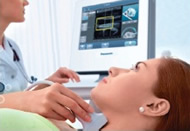|
New Test Identifies Heart & Stroke Risk Earlier
MPCP Cardiologist, Dr. David Kim Explains CIMT
We’ve made great strides in understanding the risk factors for heart disease and stroke. And we try to prevent them by eating well, exercising, controlling our blood pressure and cholesterol and avoiding bad habits, like smoking. But many people still suffer heart attacks and strokes despite these efforts. What if there was a way to identify a person’s risk earlier- and non-invasively? A new testing method, called Carotid Intima-Media Thickness- or CIMT- is doing just that.
 CIMT testing utilizes ultrasound to examine the inner lining (i.e., Intima and Media layers) of the carotid arteries in your neck. These layers are known to gradually thicken over the years as part of the normal aging process. But if this thickening is accelerated, it suggests that that person may be at higher risk of eventually developing full atherosclerosis (“hardening of the arteries”) --the step that often leads to a heart attack or stroke.
CIMT testing utilizes ultrasound to examine the inner lining (i.e., Intima and Media layers) of the carotid arteries in your neck. These layers are known to gradually thicken over the years as part of the normal aging process. But if this thickening is accelerated, it suggests that that person may be at higher risk of eventually developing full atherosclerosis (“hardening of the arteries”) --the step that often leads to a heart attack or stroke.
Indeed, multiple research studies have shown that premature intima-media thickening identifies those at a higher risk for a cardiac event even more than previously thought. Knowing your CIMT may be very useful in formulating a more precise strategy of prevention that is targeted for you. Click to read more.
|
|
|
|
|

ADD in Adults
By: Janice Rutkowski, M.D.
ADD & ADHD* are similar disorders that often first present in childhood, but can extend into adulthood as well. It is estimated that a full third of children with ADD will continue to be affected later in life. Since this disorder was not well understood in the past, many individuals were un-diagnosed. But the onset of the internet and better understanding of disordered human behavior, have helped many patients realize they may have a problem.
Most adults with ADD find they have...
Click to read more.
|
|

3 Key Steps to a Healthier Weight
Q&A with
Dr. Falana Carter
Q: What are the key challenges for patients who struggle with weight?
A: Given the demands of family, career, and social responsibilities, it’s no wonder many people find that their health is pushed to the end of the priority list. I tell patients who struggle with obesity that there are 3 simple steps to improve their cardiac health, lower cholesterol, and reduce...
Click to read more.
|
|
|
|
|
|